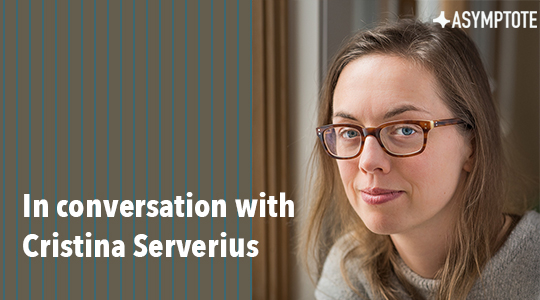As a postdoctoral research fellow at Simon Fraser University’s Centre for Education, Law, and Society, Cristina Serverius continues her lifelong quest to “understand humans, understand the self, and understand community,” while promoting educational environments that encourage all its participants to thrive. Native to Belgium, she earned an M.Ed in Contemplative Inquiry and Approaches from SFU and a Ph.D. in Comparative Literature from Brown University. Cristina currently works as an educational consultant. Asymptote for Educators Lindsay Semel interviews her about the questions driving her interdisciplinary inquiries and how they manifest in the classroom.
LS: From the perspective of a border-crossing scholar (in terms of discipline, country, and language), can you speak about the extent to which education is or isn’t a field/practice rooted in place? How does your foreignness impact your relationships within the schools?
CS: I think it is extremely important for education to be rooted in place, and for children to learn about the world through their immediate surroundings. We do children (and the environment!) a great disservice by denying them an intimate knowledge of their surroundings in favor of studying the world “at arm’s length,” as physicist Arthur Zajonc calls the learning enforced in many schools, which adhere to a rigid barrier between self and object of study. How are we supposed to learn to care for a neighbor or a local marshland when we are taught in a context of separation; how can we examine the far-away before we explore that which is close by? In Belgium, we call secondary school “humaniora,” a place where one becomes a human. Most schools, for a variety of structural, systemic, and societal reasons, have forgotten their role in this process and have been reduced to places where (a certain kind of) knowledge transfer either happens or, frustratingly, doesn’t happen.
Obviously, when looking at place-based education, we have to consider that places (and the communities that inhabit them) change over time. Place-based education in Belgium, for example, must include exploration of the large Maghrebi communities; the village church and the mosque are both opportunities for place-based learning. As such, it is representative of contemporary society for Canadian schools to have staff who did not attend Canadian elementary or secondary schools, and a great deal of the children attending school now are first-generation Canadians. Bringing in staff who do not have a Canadian background can lay bare and put up for debate some of the things we do “because they’ve always been done this way,” and that can only be healthy for any organization. My (or any other foreigner’s) learning about the school system starts a conversation that necessarily leads to self-reflection for those who have been embedded (in this case) in the Canadian system. Those are wonderful conversations that advance learning for both parties.

